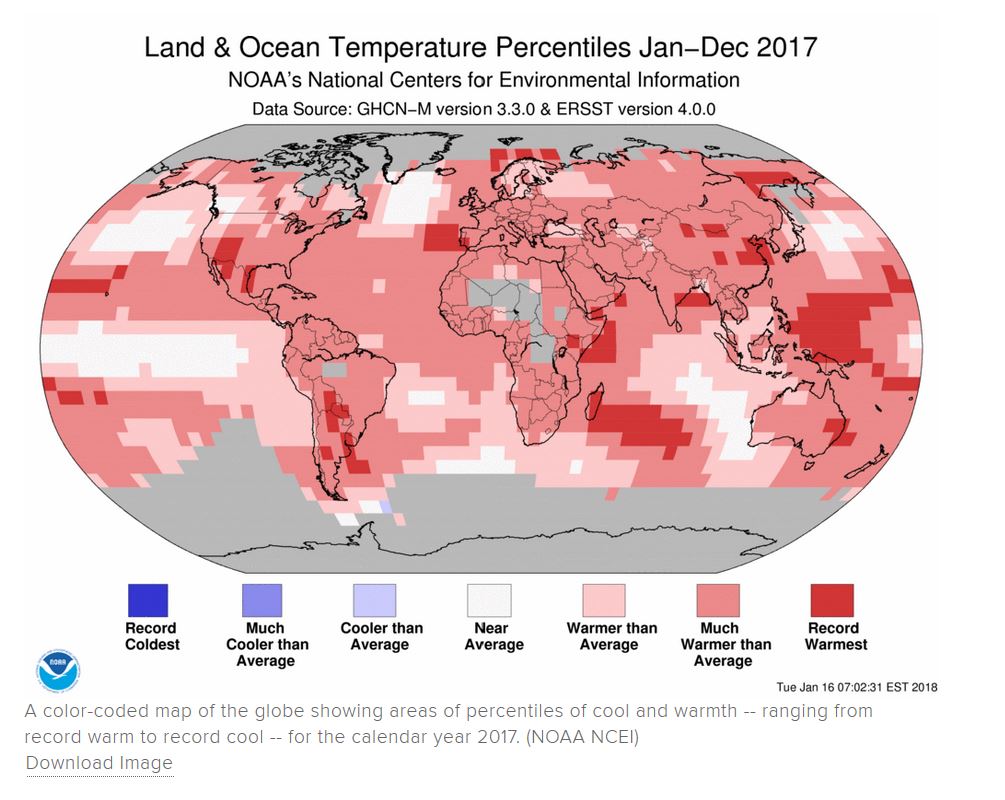
“2017 was 3rd warmest year” but “warmest year without an El Niño present”
“2017 was the third warmest year on record and the warmest year without an El Niño present.”
“2017 was the third warmest year on record and the warmest year without an El Niño present.” This was the overall finding from NOAA’s National Center for Environmental Information in its yearly update of climate data, published yesterday.
Things might even be worse. In a separate analysis of global temperature data, NASA scientists ranked 2017 to be the second warmest on record, behind the record year of 2016. This slight discrepancy is due to differences in how the agencies measure temperature.
Other scientists concur: Analyses from the United Kingdom Met Office and the World Meteorological Organization also ranked 2017 among the top three warmest years on record. And if the warming temperatures of El Nino and El Nina were removed from the data, 2017 would be the hottest year on record.
“The planet is warming remarkably uniformly,” said Gavin Schmidt, director of NASA’s Goddard Institute for Space Studies and Center for Climate Systems Research. And what is clear is that the overall trend is one of warming which is getting worse:
The average temperature across the globe in 2017 was 1.51 degrees F above the 20th century average of 57 degrees F. 2017 marks the 41st consecutive year (since 1977) with global land and ocean temperatures at least nominally above the 20th-century average. The six warmest years on record for the planet have all occurred since 2010 and 17 of the 18 hottest years on record have occurred this century.
The seas are not faring well either, with record high sea surface temperatures were observed across parts of the western and central Pacific Ocean, western and northern Indian Ocean and northern and southern parts of the Atlantic Ocean. No ocean areas were record cold for the year.
Scientists have responded across the globe with a sense of alarm and urgency to the news: “This is human-caused climate change in action,” said the Nobel prize winning chemist, Mario Molina.“Climate is not weather, (which) can go up and down from year to year. What counts is the longer-term change, which is clearly upwards.”
Dr Dann Mitchell, at the University of Bristol in the UK spoke to the Guardian. “We are getting ever closer to the Paris agreement target of 1.5C which we are so desperately trying to avoid,” he said.
Prof Michael Mann, one of the world’s leading cliamte scientists from Pennsylvania State University in the US also told the paper: “While climate change deniers continue to bury their heads in the sand, global warming continues unabated. And the impacts of that warming – unprecedented wildfires, superstorms and floods – are now plain for all to see. There has never been greater urgency.”
Bob Ward, policy and communications director at the Grantham Research Institute on Climate Change and the Environment at the London School of Economics and Political Science, also said in a statement: “The record temperature should focus the minds of world leaders, including President Trump, on the scale and urgency of the risks that people, rich and poor, face around the world from climate change.”
Next week, Trump is due to visit the World Economic Forum, which has delivered a strong rebuke about the President’s stance on climate change. In the meantime, no doubt, the President will dismiss the latest climate data as “fake news”.

